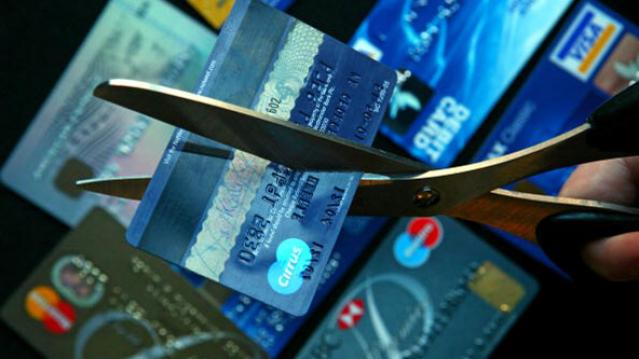How to Defuse Exploding Consumer Credit Debt

The average household had a credit card balance of $7,177 in the first quarter, the highest level in six years, according to a new report by CardHub.
Total consumer credit card debt in the U.S. amounted to more than $57 billion for the quarter, despite paying off $34.7 billion in the quarter.
There was some good news in the report: Credit card defaults for the quarter declined more than $350 million to the lowest rate since 1995, and first quarter debt reduction was 7 percent large than those of the past two years.
About a third of households with credit card debt carries a balance from month to month claims a separate study by the National Foundation for Credit Counseling.
Meanwhile, the number of credit card accounts is increasing. In the first quarter, TransUnion says there were 359.64 million credit card accounts, up 4 percent from the first quarter of 2014.
CardHub estimates that net credit card debt for the year will be $55.8 billion, roughly the same level as last year.
Consumers with high levels of credit card debt could benefit from taking advantage of some of credit card transfers, which are among the sweetest they’ve been in years, with many issuers offering zero-percent transfers for a year or more.
Look for a deal that includes no transfer fees or annual fees. Rolling over debt only makes sense if you can pay it off before or immediately after the introductory rate expires.
Chart of the Day: Long Way to Go on Coronavirus Testing

The White House on Friday unveiled plans for a new effort to ramp up testing for Covid-19, which experts say is an essential part of limiting the spread of the virus. This chart from Vox gives a sense of just how far the U.S. has to go to catch up to other countries that are dealing with the pandemic, including South Korea, the leading virus screener with 3,692 tests per million people. The U.S., by comparison, has done about 23 tests per million people as of March 12.
After Spending $2 Billion, Air Force Bails Out on Planned Upgrades of B-2 Bombers

The Air Force has scrapped a planned upgrade of its B-2 stealth bomber fleet — even after spending $2 billion on the effort — because defense contractor Northrup Grumman didn’t have the necessary software expertise to complete the project on time and on budget, Bloomberg’s Anthony Capaccio reports, citing the Pentagon’s chief weapons buyer.
Ellen Lord, the undersecretary of defense for acquisition and sustainment, told reporters that the nearly $2 billion that had already been spent on the program wasn’t wasted because “we are still going to get upgraded electronic displays.”
Big Hurdle for Sanders’ Plan to Cancel Student Debt

Bernie Sanders wants to eliminate $1.6 trillion in student debt, to be paid for by a tax on financial transactions, but doing so won’t be easy, says Josh Mitchell of The Wall Street Journal.
The main problem for Sanders is that most Americans don’t support the plan, with 57% of respondents in a poll last fall saying they oppose the idea of canceling all student debt. And the politics are particularly thorny for Sanders as he prepares for a likely general election run, Mitchell says: “Among the strongest opponents are groups Democrats hope to peel away from President Trump: Rust Belt voters, independents, whites, men and voters in rural areas.”
Number of the Day: $7 Million

That’s how much Michael Bloomberg is spending per day in his pursuit of the Democratic presidential nomination, according to new monthly filings with the Federal Election Commission. “In January alone, Bloomberg dropped more than $220 million on his free-spending presidential campaign,” The Hill says. “That breaks down to about $7.1 million a day, $300,000 an hour or $5,000 per minute.”

